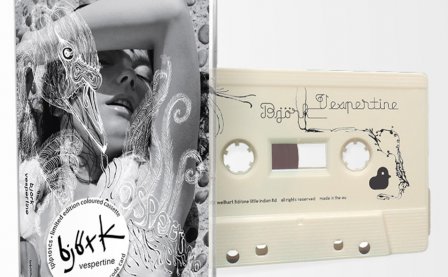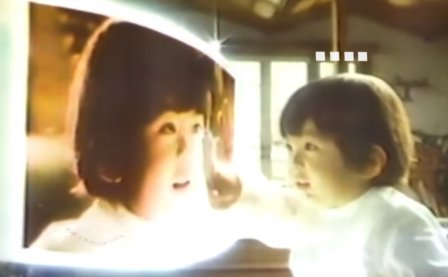There's one artist, and one alone, for whom the very mention of a new release gets me excited. And of course that's Björk. Lightning Bolt, Jim O'Rourke, Mudvayne... I'll certainly prick my ears up, but I'll hold off giddiness until I'm actually listening to their latest offering. But for some reason, Björk gets me all atwitter months ahead of the announcement of a release date. I guess I think she's the closest thing to the Beatles, straddling the divide between progressive and popular music, around today. And, well, I think she's utterly enchanting. Not even so much physically, but her lack of guile and her pure sense of joy in making music are from some kind of reliquary of artistry. She's one of those few artists about which you can believe that the music springs forth almost unconsciously and effortlessly; that life is her muse. And as a girl after my own heart, she has never stopped innovating herself. I know her music isn't anywhere near the bleeding edge of music, but I find it to be the best (only?) meaningful parsing of the musical avant-garde.
And all of this coming off of what I feel is easily her weakest album. Medülla was an entirely novel beast (I fancy) for Ms. Guðmundsdóttir, in that it sprung out of a designed conceit rather than from her heart and desire. And I think she might have recognized that would be an important move for her art. Her career had already spanned the entirety of musical history, metaphorically. Going all the way back to the beginning, she was singing folk (primitive) music. She then updated that to the most enduring of musical genres, popular music, with the Sugarcubes and Debut. Post primarily mapped out the more dark side of music, but added more layers and complexity, pointing towards the apex and epical Homogenic. A triumph of density and sheer conventional beauty, and operatic in scope, Homogenic seemed to be as far as she could go down the main road of musical exploration. So, she did what so many composers did; she started to explore the art of silence and aural space with Vespertine, an underrated masterpiece. Stripping away the countless and nearly indiscernible (absent obsessive study) layers and keeping the most essential, she found a way to create something almost entirely different but emotively very similar. And I think she hit a wall. She had, and I'm inclined to agree, taken "pretty" music to its logical endpoint, short of microscopic tinkering. And her career is evidence that tinkering isn't the method by which Björk works.
Which brings us back to Medülla: Björk was at a standstill, and had to intellectualize a way to innovate her music. Maybe she'd been hanging around vocal purists Mike Patton or Mr P quite a bit recently, but she got it in her head that she wanted to make an album consisting entirely of the human voice. And this is where I believe the art suffered. Björk's genius lay in its instinctive nature, but here she had created rigid parameters for creation. But, as an artist in the sense that she's compelled to create, she labored through the difficulty of an entirely new process and made an album that on the whole wasn't the masterpiece we might've hoped, but encouragingly there were some tracks that were truly inspired. This is why, I'm certain, she chose not to tour the material and to return immediately to the studio. She wasn't comfortable with that music, but she had become comfortable with these new toys she had acquired in the process of making it.
She found dissonance and sonic oddities and ugliness. In other words, she had immeasurably expanded her palette, just like composers of the 20th century had done. And there's nothing like ugliness and brutality to at once highlight the beauty of life and to set forth to create a work that is True. This brings us to this album, Drawing Restraint 9, wherein for the first time Björk chooses to facilitate her past aesthetic affectations, mainly from Homogenic, Vespertine, and Medülla, crassly put as complexity, simplicity, and absurdity. And the result is an album that's inspiring in its ambition.
You're probably stuck on that word. Ambition. It implies the album doesn't quite live up to its full potential. Which is true. But, while true, it doesn't mean a whole hell of a lot. The rub here is that we've got these songs that don't quite work together as a cohesive album, an expectation only because Björk's albums generally do. They are all remarkable accomplishments, but moving from song to song can be jarring. In her defense, it is a soundtrack, and that can be expected. Björk, being the clever girl she is, and this is purely speculation, might have couched these songs in this format to make them presentable. Which is to say I'm not convinced these songs were made specifically to score her boyfriend's movie. I imagine Björk was fervently inspired by her newfound direction and ability, and rattled off what she could as urgently as possible. My job is to be a reviewer, not a prognosticator, but I think it all bodes very well for Björk as an Important Artist. Let's just say I'm already excited for whatever comes next.
1. Gratitude
2. Pearl
3. Ambergris March
4. Bath
5. Hunter Vessel
6. Shimenawa
7. Vessel Shimenawa
8. Storm
9. Holographic Entrypoint
10. Cetacea
11. Antarctic Return
More about: Bjork




